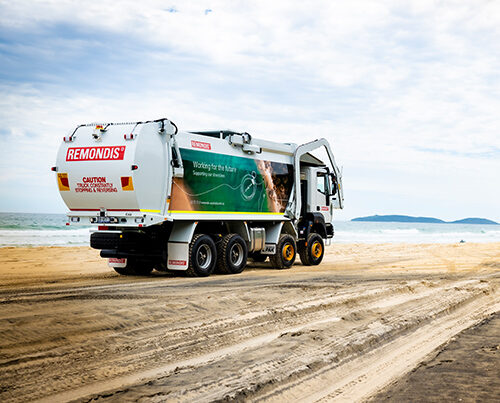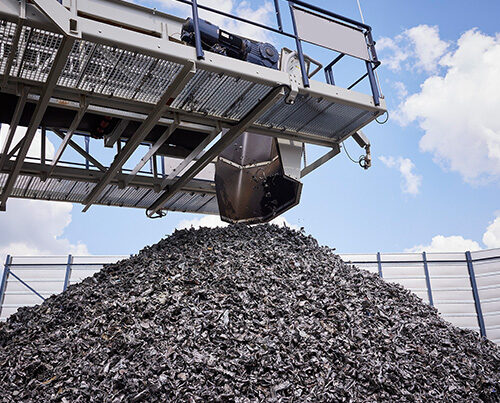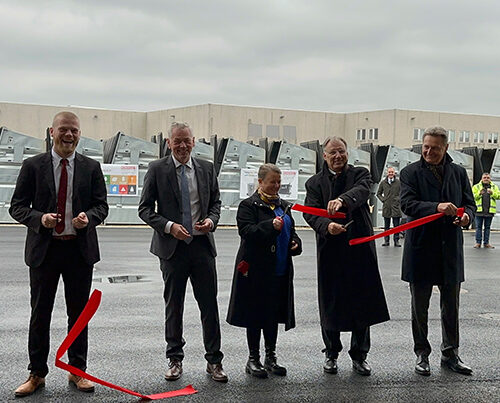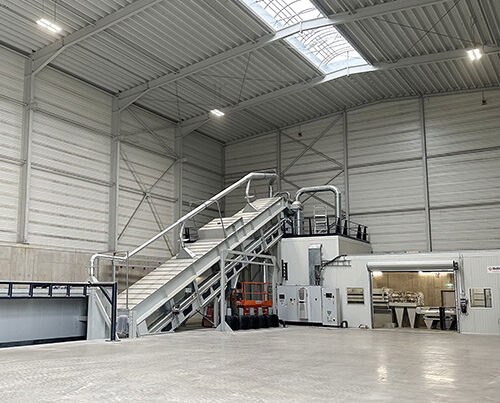Recycling rather than disposal
The days when the waste management industry simply collected and transported waste are long gone. Today, everyone is focusing on ‘closing material cycles’ or ‘closing the loop’ i.e. recovering materials so they can be reused or sent for thermal treatment. The annual “Status Report on the German Circular Economy” (published as part of a study drawn up by the PROGNOS and INFA institutes on behalf of the nine largest private and public sector associations) takes a look at both the current and future performance and objectives of the industry. Prof. Martin Faulstich from the think tank, INZIN [Institute for the future of the industrial society], provided those doing the study with scientific support. The report reveals that the German waste management sector continues to enjoy steady growth and has a high quality recycling infrastructure in place. This is also illustrated by the fact that Germany leads the way when it comes to using recycled raw materials in production processes – although there is plenty of room for improvement here, too, as only 14% of all raw materials used by the manufacturing industry is supplied by the recycling sector.

A comprehensive infrastructure
Thanks to its wide range of products and services, the German sector is already in a position to help overcome the current and future challenges faced by society. Every year, around 400 million tonnes of residual materials are collected, sorted and recycled in Germany. The majority of this material is construction and demolition waste, followed by industrial, commercial and municipal waste. An extensive infrastructure is in place across the country to handle these volumes that includes 15,800 plants and facilities as well as 10,800 public and private sector companies.
Read more about the industry’s activities in the article on the EU’s Circular Economy Package.
REMONDIS appears here as just one of many market players and is nowhere near the biggest. As can be seen by the takeover of Tönsmeier, the fifth-largest recycling firm in Germany, by the Schwarz Group, Europe’s biggest retail group. New on the market, Schwarz’s subsidiary, GreenCycle, has an annual turnover of 96.7 billion euros (2017), thirteen times that of REMONDIS, and employs 145,000 people. The group is, therefore, clearly looking to expand its recycling operations in the country and already has a workforce that comprises almost half of all the people working in the waste management industry. Pre Zero, the online platform for commercial customers that also belongs to the Schwarz Group, is helping to grow and add impetus to the market as well. This is further proof that there are no restrictions whatsoever to new companies entering the market and that there are certainly no monopolies around. Only the municipal and state-owned businesses have laid claim to around 50% of the overall market.
Bigger, better, broader
Together, the industry’s operations generate an annual turnover of 76 billion euros and provide over 290,000 people with a secure job. REMONDIS and its subsidiaries make up almost 10% of the overall market with their annual turnover of 7.4 billion euros and approx. 33,000 employees. However, if its international turnover is taken out of the equation, then REMONDIS’ market share lies at just 5.5%. The sector’s extensive further training opportunities and wide-ranging fields of activities set it apart from similar industries elsewhere. There are two main reasons why the German recycling industry has a technological edge and such a strong position: firstly, the importance given to the whole subject of recycling by the German population and, secondly, the country’s waste legislation, which is constantly setting new and more ambitious goals. The technological innovations that came out in Germany early on have played a decisive role – both in advancing plant technology and in growing exports: the volume of exports for waste technology alone lies at 4.3 billion euros. The most important markets here are the US, China and France.
Germany is among the global leaders for registered patents as well, namely in 4th place. Increased competition, however, is coming from China, the US and Japan who are learning from the German exports and using this knowledge to grow their own know-how. This trend is further confirmed by the number of Chinese investors who have bought shares in German companies over the last two years, for example in the Scholz Group (1.42 billion euro turnover), in EEW (541 million euro turnover) and in Alba (1.28 billion euro turnover).
Conserving resources – growing recycling – curbing climate change
The report also outlines three objectives: top of the list is conserving natural resources in order to protect the environment and prevent global warming. Looking at the way the global population is growing, action will have to be taken in this area. Experts estimate that there will be around 9.7 billion people living on our planet in 2050. And, logically, as the population and consumption increase, so too will the per capita consumption of resources: humans will need two planets to satisfy their demand for natural resources in 2030 or even three planets if everyone has the same living standards as we have in Germany today.
Consequently, Earth Overshoot Day falls a little bit earlier every year. This year, it was on 01 August. Our attempts to create an environment worth living in are being thwarted by two factors: on the one hand, the so-called rebound effect cancels out any gains in efficiency we may achieve. On the other, the current raw material prices, which have been increasing since 2000, do not reflect the impending shortage of raw materials. There is no incentive to conserve our supplies of primary resources.
We have been living beyond our means since 01 August. On this day is Earth-Overshoot-Day.
A three-pronged recycling initiative
Both those who published the circular economy report and REMONDIS agree that simply conserving resources will not be enough. A genuine circular economy must be set up and a national raw materials strategy must be drawn up and implemented.
This automatically includes ensuring that more residual materials are recycled and that production processes are made more sustainable by increasing the use of recycled raw materials. Only if this happens and only if the relevant regulations are in place can the circular economy’s third goal be achieved – i.e. to lower carbon emissions. The industry has already enjoyed a number of successes in this area by closing landfills and improving energy efficiency levels. Emissions of CO2 equivalents fell by 67% between 1990 and 2015 – from 38 million tonnes to 12 million tonnes. And we should build on this success. By optimising the technology used by the sector and by further improving the way the industry is organised to create a genuine circular economy – as REMONDIS is already doing.
The future: “made in Germany”
Those attending included BDI President Prof. Dieter Kempf, the Federal Minister for Economic Affairs and Energy Peter Altmaier and the executive chairman and founder of Ivanhoe Mines Ltd., Robert Friedland, as well as REMONDIS managing director, Herwart Wilms, and BDE President Peter Kurth. They looked at a number of issues in detail to highlight the main challenges that Germany will have to face regarding the future availability of raw materials.
Herwart Wilms and Peter Kurth took part in a panel discussion on the “Potential of the Circular Economy” where they stressed the economic importance of the industry – both from point of view of turnover and jobs. “The country already has good collection and recycling structures and yet we are rarely able to fully close material life cycles,” Herwart Wilms explained. “We will only be able to fulfil our social tasks – climate change, the energy switch and raw material supplies – if more and better framework conditions are put in place to promote the circular economy,” he added.
Guests from the world of politics, business and science discussed this subject in depth at the BDI’s Raw Materials Congress which was held in Berlin on 03 July 2018.
The EU is listening
He also criticised the fact that the success of plastics recycling is too dependent on the price of crude oil and called on politicians to improve the framework conditions in this area. The objective here must be to grow the market for recycled plastics – either through voluntary measures, banning certain substances and processes, offering tax benefits or generating a minimum content. To tackle this challenge, the EU has drawn up a plastics strategy which is part of the European Circular Economy Package passed by the EU Parliament in April 2018. REMONDIS supports these plans but would prefer to see industries either voluntarily or being obliged to use recycled plastics in their production processes rather than the current symbolic activities, such as banning ten different types of plastic product. Despite the success in Germany, there is still a long way to go before a genuine circular economy is in place – and this will only be possible if everyone follows the same agenda.
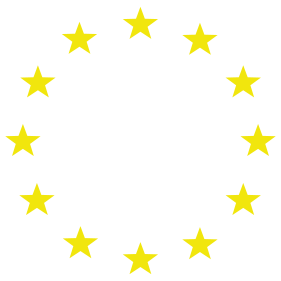
Image credits: image 1: Fotolia: violetkaipa; image 2: bigstock: Chinnapong







